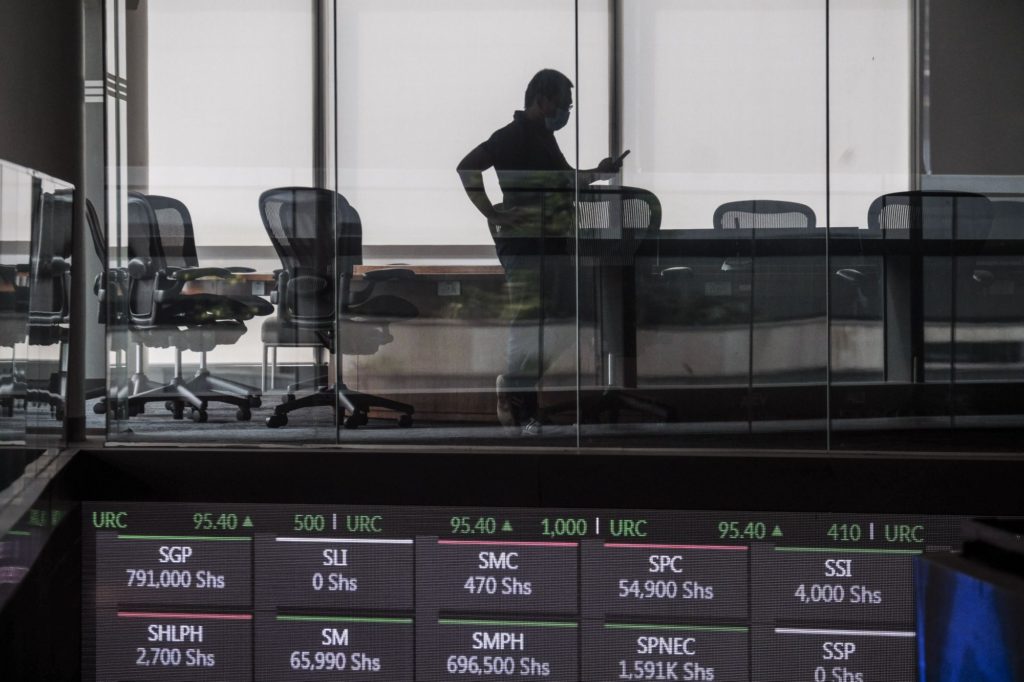The dollar rose to another record after the White House talked down the prospect of weakening the currency, while UK bonds surged after the Bank of England said it would buy long-dated government bonds in whatever quantities were needed to restore order to the market.
(Bloomberg) — The dollar rose to another record after the White House talked down the prospect of weakening the currency, while UK bonds surged after the Bank of England said it would buy long-dated government bonds in whatever quantities were needed to restore order to the market.
The yield on 30-year gilts plummeted by the most in data going back to 1996, erasing an earlier jump to the highest since 1998. The pound initially bounced before falling back amid mounting global criticism of Prime Minister Liz Truss’s historic tax-cutting plan. Ten-year Treasury yields reversed lower after earlier rising to the highest since 2008.
US futures fell and European stocks extended declines as Citigroup Inc. strategists said investors are abandoning that region at levels last seen during the euro area debt crisis. Asian shares also dropped.
Health care shares rose after Eisai Co. and partner Biogen Inc. said their drug significantly slowed Alzheimer’s disease, while miners underperformed as the strong dollar and concerns about demand for raw materials sent commodity prices to the lowest level since January. Apple Inc. fell in premarket trading after a report that it scrapped plans to increase iPhone production.
Meanwhile, natural gas prices in Europe surged after Russia said it may cut off supplies via Ukraine and the German Navy was deployed to investigate the suspected sabotage to the Nord Stream pipelines. Putin moved to annex a large chunk of Ukrainian territory amid a string of military setbacks in its seven-month-old invasion.
The BOE’s decision to announce unlimited and immediate purchases of long-dated bonds was prompted by fears that collateral calls as soon as Wednesday afternoon could trigger a further crash in gilts, according to a person familiar with policy makers’ decision making.
The BOE said purchases will be up to £5 billion per operation and that it stands ready to purchase conventional gilts with a residual maturity of more than 20 years in the secondary market. It will also postpone the beginning of its quantitative tightening bond sales, due to begin on Monday.
Earlier, the International Monetary Fund called the unfunded tax cuts excessive and in need of revision, while Moody’s Investors Service warned that it risks doing lasting damage to the nation’s debt affordability. Mohamed El-Erian, chief economic adviser at Allianz SE, said it means the Bank of England will need to raise interest rates by at least 100 basis points at its next meeting on Nov. 3.
The dollar’s rally brought losses to other currencies, including the euro and onshore yuan, which tumbled to its weakest level since 2008. A regulatory body guided by the People’s Bank of China urged banks to protect the authority of the yuan fixing.
The yen remained near levels that have drawn intervention from Japan, spurring speculation it may intervene further, potentially funded by Treasuries sales.
“The fact we have such a strong increase in US yields is attracting flows into the US dollar,” said Nanette Hechler-Fayd’herbe, chief investment officer of international wealth management for Credit Suisse Group AG. “As long as monetary and fiscal policy worldwide are really not coming to strengthen their own currencies, we should be anticipating a very strong dollar.”
Adding to concerns, Deutsche Bank AG Chief Executive Officer Christian Sewing predicted a severe downturn in the lender’s home region and said the volatility whipsawing markets will continue for another year as central banks tighten rates to fight inflation.
European Central Bank President Christine Lagarde said borrowing costs will be raised at the next “several meetings,” with several Governing Council members favoring a 75 basis point hike in October.
In other news, Hurricane Ian rapidly gained strength, with winds just 2 mph away from reaching Category 5 strength, the most powerful category for a storm on the Saffir-Simpson scale, according to the National Hurricane Center.
How much damage is a strong dollar causing? That’s the theme of this week’s MLIV Pulse survey. It’s brief and we don’t collect your name or any contact information. Please click here to share your views.
Key events this week:
- Fed’s Mary Daly, Raphael Bostic and Charles Evans speak at events, Wednesday
- Euro zone economic confidence, consumer confidence, Germany CPI, Thursday
- US initial jobless claims, GDP, Thursday
- Fed’s Loretta Mester, Mary Daly speak at events, Thursday
- China PMI, Friday
- Euro zone CPI, unemployment, Friday
- US consumer income , University of Michigan consumer sentiment, Friday
- Fed’s Lael Brainard and John Williams speak, Friday
Some of the main moves in markets:
Stocks
- Futures on the S&P 500 fell 0.2% as of 8:30 a.m. New York time
- Futures on the Nasdaq 100 fell 0.6%
- Futures on the Dow Jones Industrial Average were little changed
- The Stoxx Europe 600 fell 1.2%
- The MSCI World index fell 0.1%
Currencies
- The Bloomberg Dollar Spot Index rose 0.2%
- The euro fell 0.2% to $0.9579
- The British pound fell 1% to $1.0626
- The Japanese yen rose 0.1% to 144.61 per dollar
Cryptocurrencies
- Bitcoin fell 0.4% to $19,005.7
- Ether fell 1.9% to $1,299.93
Bonds
- The yield on 10-year Treasuries declined five basis points to 3.89%
- Germany’s 10-year yield advanced one basis point to 2.24%
- Britain’s 10-year yield declined 39 basis points to 4.11%
Commodities
- West Texas Intermediate crude rose 1.2% to $79.47 a barrel
- Gold futures rose 0.3% to $1,640.60 an ounce
More stories like this are available on bloomberg.com
©2022 Bloomberg L.P.











